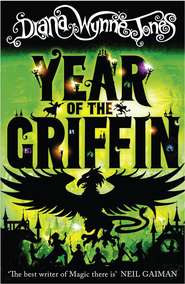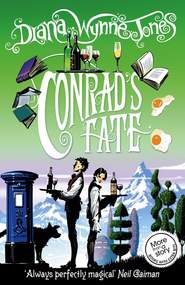По всем вопросам обращайтесь на: info@litportal.ru
(©) 2003-2024.
✖
Hexwood
Настройки чтения
Размер шрифта
Высота строк
Поля
(#uad1afb1d-a984-5aa1-a6a7-e5ccb7f0016c)
Mordion got off his rock hastily when Ann appeared, breathlessly dragging Hume and the lurching, damaged robot. He found it hard to make sense of what they were telling him. “You went to the castle? Are they still chasing you? I’ve no weapon!”
“Not exactly,” Ann panted. “It was Hexwood Farm in the future. Except the soldiers were like the Bayeux tapestry or something.”
“I told them,” rattled Yam. His voicebox seemed to be badly damaged. “Beyond trees. Soldiers. Me for. Afraid of Sir Artegal. Famous outlaw.”
“Mend him, mend him, Mordion!” Hume pleaded.
“So they’re not following?” Mordion said anxiously.
“I don’t think so,” said Ann, while Yam rattled, “Inside. Me for. Famous knight. Cowards.”
Hume pulled Mordion’s sleeve and shouted his demand. “He’s broken! Please mend him. Please!”
Mordion could see Hume was frightened and distressed. He explained kindly. “I don’t think I can, Hume. Mending a robot requires a whole set of special tools.”
“Ask for them then – like the nails,” said Hume.
“Yes, why not?” Ann said, unexpectedly joining Hume. “Ask the parawhatsit field like you did for the aeroplane food, Mordion. Yam stopped two crossbow bolts and saved Hume’s life.”
“He was brave,” Hume agreed.
“No,” Yam whirred. He sounded like a cheap alarm clock. “Robot nature. Glad. Mended. Uncomfort. Like this.”
Mordion pulled at his beard, dubiously. If he used the field the way Ann and Hume were suggesting, he sensed he would be admitting a number of things about himself which he would rather not admit. It would be like turning down a forbidden road that led somewhere terrible, to face something he never could face. “No,” he said. “Asking for things is cheating.”
“Then cheat,” said Ann. “If those soldiers go back for reinforcements and come after us, you’re going to need Yam’s help. Or start being an enchanter again, if you won’t cheat.”
“I’m not an enchanter!” Mordion said.
“Oh blast you and your beastly field!” Ann said. “You’re just giving in to it and letting it make you feeble!” She found she was crying with anger and frustration, and swung round so that Mordion should not see. “Come on, Hume. We’ll see if my dad can mend Yam. Yam, do you think you can get across that river down there?”
“You know Hume shouldn’t go out of the wood,” Mordion said. “Please, Ann—”
“I’m – disappointed in you!” Ann choked. Bitterly disappointed, she thought. Mordion seemed to be denying everything she knew he was.
There was a helpless silence. The river rushed below. Yam stood swaying and clanking. There were tears running down Hume’s face as well as Ann’s. Mordion looked at them, hurt by their misery and even more hurt by Ann’s contempt. It was worse because he knew, without being able to explain to himself why, that he had earned Ann’s scorn. He did not think he could decide what to do. He did not think he had decided anything, until a large roll of metalcloth clanked to the ground at his feet.
“Did you ask for this?” Mordion said to Hume.
Hume shook his head, sending tears splashing. Ann gave a sort of chuckle. “I knew you’d do it!” she said.
Mordion sighed, and knelt down to unwrap the cloth. He spread it across the earth under the pine tree to find every kind of robotics tool in there, tucked into pockets in rows: tiny bright pincers and power drivers, miniature powered spanners, magnifying goggles, spare cells, wire bores, a circuit tester, a level, adhesives, lengths of silver tegument, cutters …
Yam’s rosy eyes turned eagerly to the unrolled spread. To Mordion’s fascination, a sort of creasing bent the blank modelling of Yam’s mouth. The thing smiles! he thought. What a weird antique model! “Old Yamaha,” Yam warbled. “Adapted. Remodelled. Trust. Correct tools?”
“I’ve seldom seen a more complete kit,” Mordion assured him.
“You told me you were old Yamaha before,” Hume said.
“Not,” Yam rattled. “Gone back. Time you first found me. Think everything. Told for first time. Hush. Mordion work.”
Hume obediently sat himself on a smooth brown rock, with Ann on the ground beside him. They watched Mordion roll up the sleeves of his camel-coloured robe and unscrew a large panel in Yam’s back, where he dived in with some of the longer tools and did something to stop Yam lurching almost at once. Then he whipped round to the front of Yam and undid the voicebox at the top of Yam’s neck. “Say something,” Mordion said, after a moment.
“THAT IS MUCH—” Yam’s normal flat voice boomed. Mordion hurriedly twiddled the power-driver. “Better than,” Yam said, and went on in a whisper, “it was before,” and was twiddled back to proper strength to add, “I am glad it was not broken.”
“Me too,” said Mordion. “Now you can set me right if I get something wrong. You’re much older than anything I’m used to.”
He went back to the hole in Yam’s rear. Yam turned and bent his head, far further than a human could, to watch what was going on. “Those fuel cells have slipped,” he told Mordion.
“Yes, the clips are worn,” Mordion agreed. “How’s that? And if I take a turn on the neck pisistor, does it feel worse, or better?”
“Better,” said Yam. “No, stop. That red wire goes to the torsor head. I think the lower sump is wrong.”
“Punctured,” said Mordion. He bent down to the roll of tools. “More fluid. Where are the small patches? Ah, here. Do you know of any more leaks, while I’m at it?”
“Lower left leg,” said Yam.
Ann was fascinated. Mordion working on Yam was a different person, neither the mad-seeming enchanter who had created Hume, nor the harassed monk trying to build a house and watch Hume at the same time. He was cool and neutral and efficient, a cross between a doctor and a motor mechanic with, perhaps, a touch of dentist and sculptor thrown in. In a queer way, she thought, Mordion seemed far more at ease with Yam than he was with her or Hume.
Hume sat seriously with a hand on each knee, leaning forward to watch each new thing Mordion did. He could not believe Mordion was not hurting Yam. He kept whispering, “It’s all right, Yam. All right.”
Mordion turned round to pick up the magnifying goggles before starting on the tiny parts of Yam’s left leg, and noticed the way Hume was feeling. He wondered what to do about it. He could tell Hume Yam did not feel a thing; Hume would not believe him; and that would make Hume just as worried as before, but ashamed of his worry. Better get Yam himself to show Hume he was fine. Get Yam to talk about something else besides his own antique works.
“Yam,” Mordion said, unscrewing the leg tegument, “from what you said to Hume earlier, I thought you implied you’d been inside this paratypical field for some time. Does it affect you too?”
“Not as much as it affects human’s,” said Yam, “but I am certainly not immune.”
“Surprising,” said Mordion. “I thought a machine would be immune.”
“That is because of the nature of the field,” Yam explained.
“Oh?” said Mordion, examining the hundreds of tiny silver leg mechanisms.
“The field is induced by a machine,” said Yam. “The machine is a device known as a Bannus. It has been dormant but not inoperative for many years. I believe it is like me: it can never be fully turned off. Something has happened recently to set it working at full power and, unlike me, the Bannus can, when fully functional, draw power from any source available. There is much power available in this world at this time.”
“That explains the strength of the field,” Mordion murmured.
“But what is a Bannus?” asked Ann.
“I can only tell you what I deduce from my own experience,” Yam said, turning himself round to face Ann, with Mordion patiently following him round. “The Bannus would appear to take any situation and persons given it, introduce them into a field of theta-space, and then enact, with almost total realism, a series of scenes based on these people and this situation. It does this over and over again, portraying what would happen if the people in the situation decided one way, and then another. I deduce it was designed to help people make decisions.”
“Then it plays tricks with time,” Ann said.
“Not exactly,” said Yam. “But I do not think it cares what order the scenes are shown in.”
“You said that before too,” Hume said. He was interested. He had almost forgotten his worry about Yam. “And I didn’t understand then either.”











